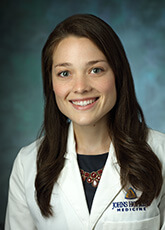Takeaway
Outstanding clinicians are humble, curious, and nonjudgmental.

Lifelong Learning in Clinical Excellence | June 23, 2022 | 2 min read
By Madeline Rodriguez, MD, Johns Hopkins University School of Medicine
As I near the end of this academic year and my year as chief resident for internal medicine at a Johns Hopkins hospital, I find myself reflecting on the ebbs and flows of academic medicine. There’s a cyclical nature to what we do; as one group of students and residents graduate, we simultaneously prepare for the next group to start this phase of their medical training. Each physician arrives at their professional identity formation and definition of clinical excellence in unique ways, and we know that many different villages come together to help support that exploration. In that spirit, I’ll share some of the lessons I’ve learned about giving clinically excellent care from the many clinicians and educators who have shaped me in my career.
1. Be humble.
A line from the poem “Gaudeamus Igitur” by cardiologist Dr. John Stone encapsulates this sentiment beautifully. It says, “For this is the day you know too little/against the day when you will know too much/For you will be invincible/and vulnerable in the same breath/which is the breath of your patients.” Clinical excellence is rooted in humility, approaching each patient with an open heart and mind.
2. Be curious, not judgmental.
Attributed to many, most recently the beloved fictional soccer coach Ted Lasso, boundless curiosity allows us to wonder, driving clinical and scholarly innovation and personal growth. The best clinicians (and clinician educators) I know take a curious stance, trying to appreciate each patient’s and learner’s lens.
3. Review your game tape.
Some of the best advice I’ve ever received is to create time for reflection, because that’s where the learning happens. Intentionally create space to review the care you’re giving to patients. Examine clinical outcomes, especially as it pertains to bias and issues around equity and inclusion. You and your patients, both present and future, will be better for it.
4. Embrace the Both/And.
All clinicians have the opportunity to face and embrace duality because we witness the human condition. Be open to multiple approaches to a clinical problem and what matters most. We can give clinically excellent care to our patients, and understand that we play a small part in their journey and many of the larger parts lie outside our expertise. When you’re feeling tension in caring for your patients, consider the both/and, and keep moving forward.
This piece expresses the views solely of the author. It does not necessarily represent the views of any organization, including Johns Hopkins Medicine.

